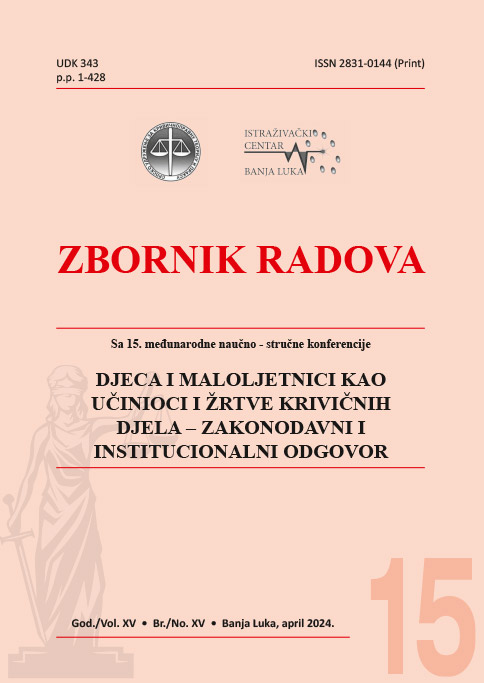EDUCATIONAL ORDERS AS NON-INSTITUTIONAL CRIMINAL LEGAL MEASURES OF REACTION TO JUVENILE DELINQUENCY (CRIMINAL AND POLITICAL REASONS FOR REGULATION, NORMS AND EXPERIENCES OF IMPLEMENTATION IN REPUBLIC OF SERBIA)
DOI:
https://doi.org/10.7251/CEST1524007BKeywords:
reform, juvenile criminal law, juvenile, educational orders, juvenile delinquency, non-institutional measures, injured party, guardianship authorityAbstract
The process of reforming juvenile criminal law in the Republic of Serbia began with the adoption of the 2005 Law on Juvenile Offenders and Criminal Protection of Juveniles. It is a legal text which, quite justifiably, regulates the criminal law issues of juvenile offenders in a special way and not within the framework of the CC, CPC and ZIKS. There are numerous novelties brought about by this legal text, and one of the most important is the legalization of educational orders as special and above all specific criminal law measures of reaction to juvenile delinquency of an extra-institutional nature. It is about sui generis criminal law measures. The legalization of this category of criminal measures of reaction to juvenile delinquency is the result of the completely correct attitude of the legislator that non-institutional measures and sanctions (educational orders, warning and guidance measures and measures of increased supervision) should be the basic instruments of reaction to juvenile perpetrators of criminal acts. However, despite the full justification of this position of the legislator on this issue, it still, when it comes to educational orders, has not been implemented in practice to the desired extent. Not only do we have an unreasonably small number of implemented educational orders, but there is also stagnation in their implementation. There are not a few reasons for this state of practical application of this category of measures. Among them, two stand out. First, we still do not have the presence of a permissible level of awareness among those who decide on the application of educational orders about their importance as an instrument of reaction to juvenile delinquency; Second, the incompleteness of the normative framework for the implementation of educational orders. The case, first of all, with the Rulebook on the implementation of educational orders, which is supposed to resolve, among other things, the issue of mutual cooperation between the subjects of its practical implementation, which, even after eighteen years of implementation of the ZMUD, has not been adopted. Bearing in mind the number of criminal and political reasons that speak in favor of this measure, it is necessary to provide all the preconditions for the desired degree of its practical application, which is not currently the case.
